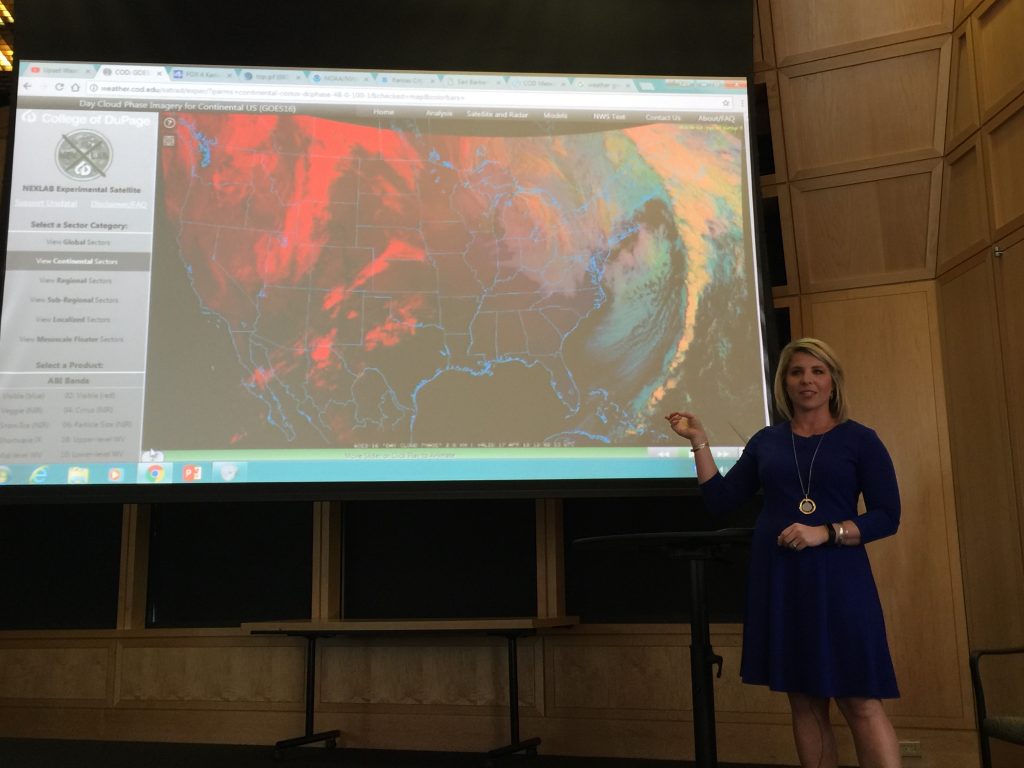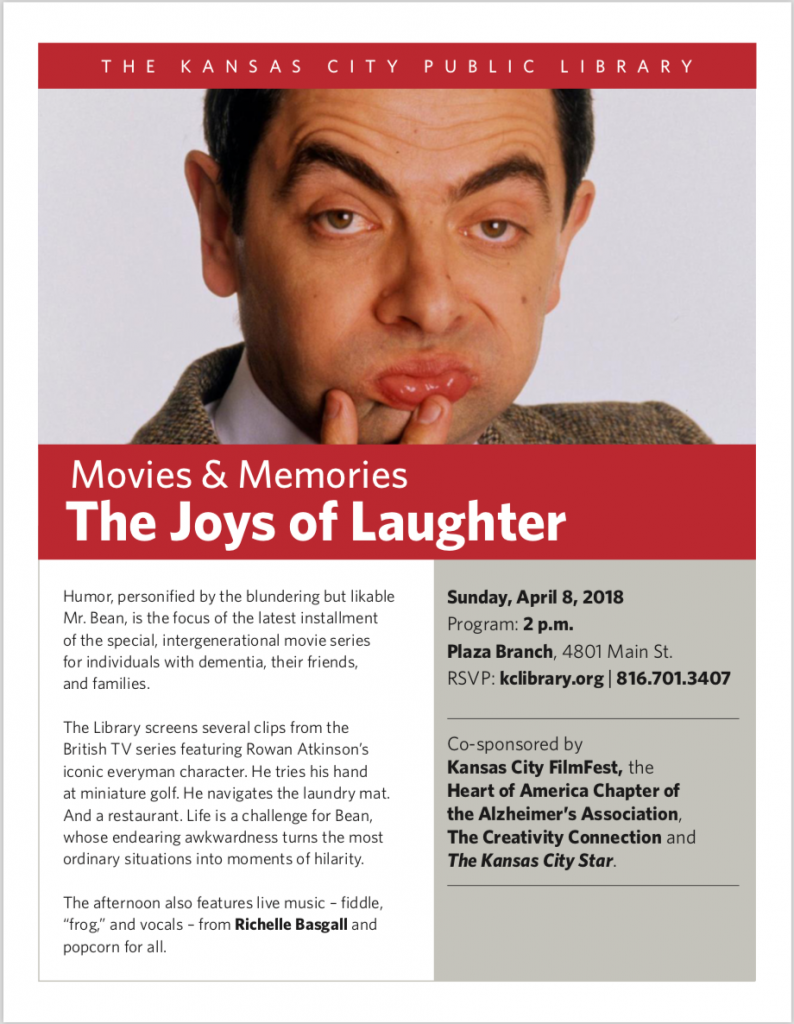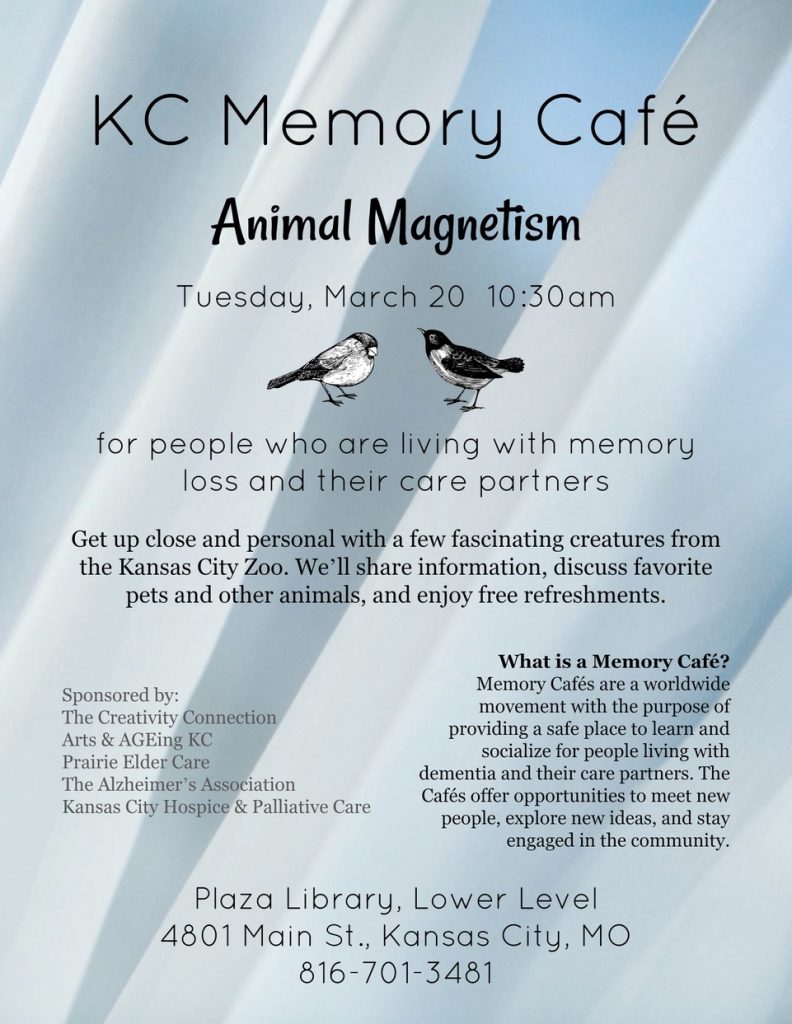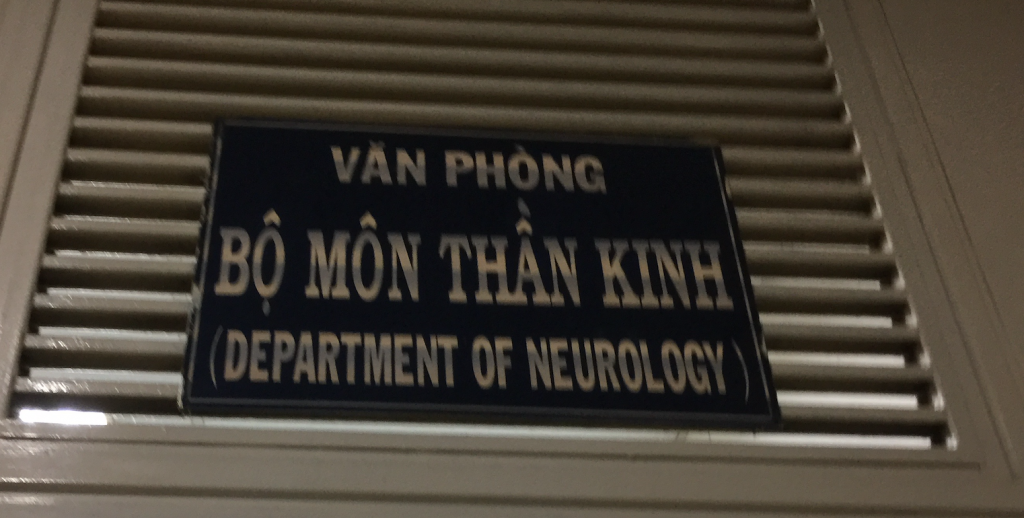Care Partnering
KC Memory Cafe: Great Weather Information Inspires Great Conversations
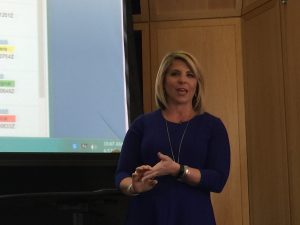 Karli Ritter is a self-described “weather nerd.” When this Fox 4 meteorologist finished her lively talk at April’s KC Memory Cafe, we all had a bit of that “weather nerd” fever in us. We listened intently as Karli described her early morning routine, up at 4:30 a.m., studying the weather maps and data so she could formulate a forecast. She detailed the complexities of being an integral part of a five-hour show: she actually appears on TV 90 times during the Kansas City Fox morning show! Her talk reminded us that great weather information inspires great conversations.
Karli Ritter is a self-described “weather nerd.” When this Fox 4 meteorologist finished her lively talk at April’s KC Memory Cafe, we all had a bit of that “weather nerd” fever in us. We listened intently as Karli described her early morning routine, up at 4:30 a.m., studying the weather maps and data so she could formulate a forecast. She detailed the complexities of being an integral part of a five-hour show: she actually appears on TV 90 times during the Kansas City Fox morning show! Her talk reminded us that great weather information inspires great conversations.
Karli has a love for storms and we were delighted with our “tornado” 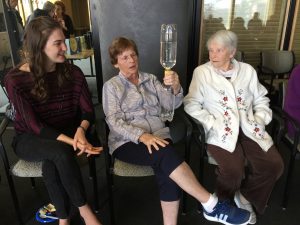 experience, courtesy of the Kansas City Public Library staff. We used a special coupler to link one empty liter bottle with one half full with water. Then we shook and turned it upside down and voila! a little tunnel tornado formed in the water! Each person was fascinated by this experiment. That led us to a conversation about personal weather experiences. Our attendees had gone through hurricanes, earthquakes, dust storms, tornadoes, nor’easter’s and much more.
experience, courtesy of the Kansas City Public Library staff. We used a special coupler to link one empty liter bottle with one half full with water. Then we shook and turned it upside down and voila! a little tunnel tornado formed in the water! Each person was fascinated by this experiment. That led us to a conversation about personal weather experiences. Our attendees had gone through hurricanes, earthquakes, dust storms, tornadoes, nor’easter’s and much more.
Our discussion continued on the way out, with guests describing the varied weather in the Kansas Flint Hills, rainbows they’d seen, family members who loved forecasting the weather, and long hot summers and long cold winters.
To watch our weather wonders, click here.
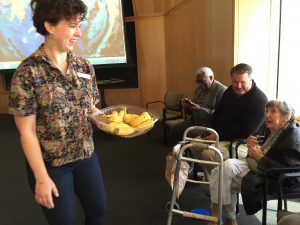
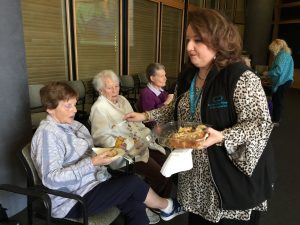 Bringing the weather home.
Bringing the weather home.
To start a weather conversation in your own family or community, use music as a catalyst. Play songs such as: You Are My Sunshine, Stormy Weather, Somewhere Over the Rainbow, Raindrops Keep Falling on My Head, The Sunny Side of the Street, Let It Snow. After each song, ask an open-ended question. “What do you like about snow?” Or,” What seasons do you like most?” Or “Have you ever been in a really big storm?” Or,”What is your favorite kind of weather?”
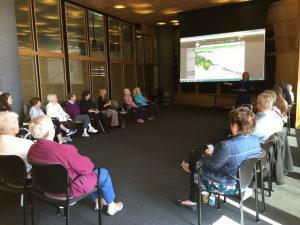
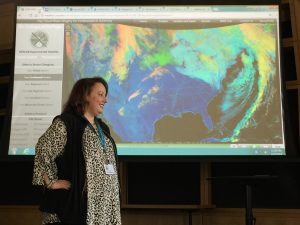 You can also play iconic movie clips that feature weather, such as the joyous tap dancing scene in Singing in the Rain, or the tornado scene in The Wizard of Oz.
You can also play iconic movie clips that feature weather, such as the joyous tap dancing scene in Singing in the Rain, or the tornado scene in The Wizard of Oz.
Dramatic weather photos and pictures can also trigger memories and comments.
Thanks to our Cafe Team and thanks for those who visited.
Our next adventure: May 15, 10:30 to 12:00, Plaza Library
Music to Our Ears: The Kansas City Symphony Brings Us Note-worthy Instruments
You’ve heard them as part of the orchestra. Now you’ll be meeting selected instruments first-hand, as the Symphony’s Margaret Halloin joins us for this delightful interactive session. Enjoy refreshments and interesting conversations as we learn more about the sounds of music.
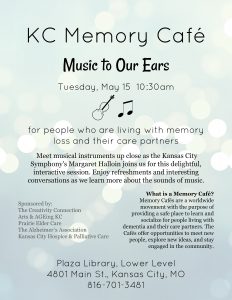
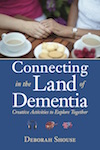
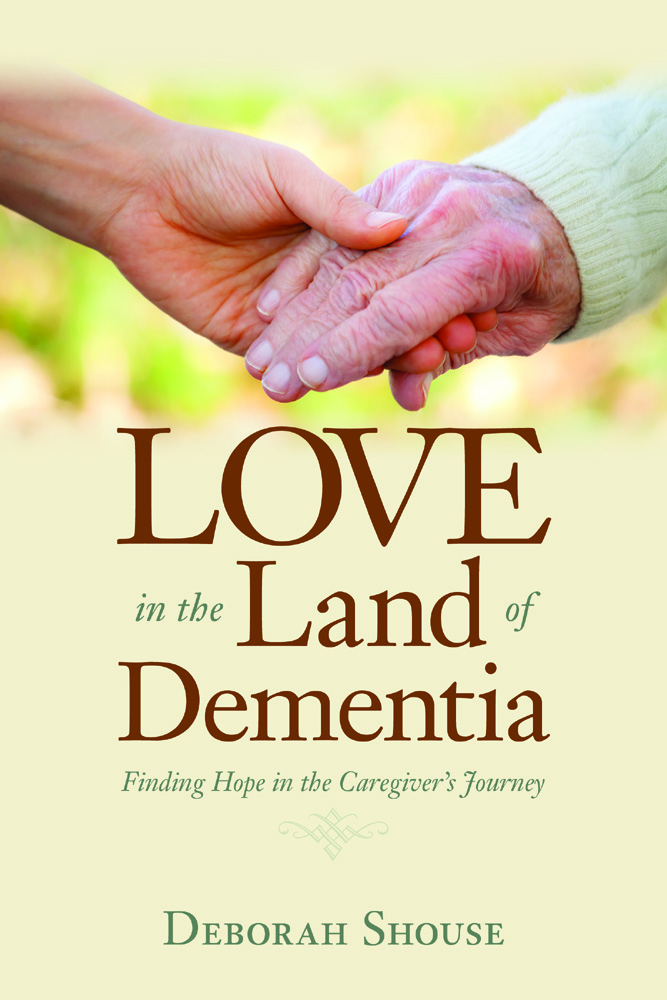
Movies and Memories: Laughter Triumphs Over Weather
It’s a Sunday morning in early April and we were excited about our Movies and Memories laughter program that afternoon at 2:00.
Then, the unthinkable happened. It started to snow, blanketing the daffodils and tulips with just enough flakes to make people want to cozy up at home.
What did we do? Laugh, of course.
Laughter was the theme of our April program and we had excerpts from the inestimable Mr. Bean to anchor our program.
As Emily from the Kansas City Public Library, Plaza Branch, made our popcorn and other library staff readied the technology, we accepted the fact that we might have only our intrepid volunteers in the audience. We all vowed to have a great time anyway.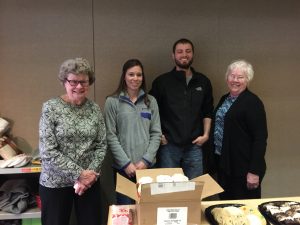
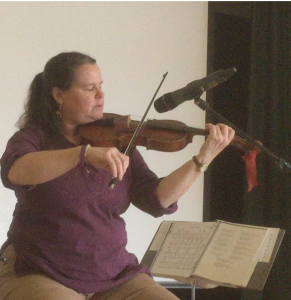 Musician Richelle Basgall regaled us with songs and stories and our guests began to arrive. Soon we had about 30 people who ignored the weather and were ready for fun. And fun we had. One of our volunteers brought us sumptuous cookies and small cakes. The aroma of fresh popcorn warmed us all and we laughed our way through a hilarious clip of Mr. Bean playing miniature golf. Then we passed out jokes, which we laughingly shared with each other. (What kind of sandwiches do astronauts eat: Launch meat! Why did the oil painting get sent to jail? It was framed!)
Musician Richelle Basgall regaled us with songs and stories and our guests began to arrive. Soon we had about 30 people who ignored the weather and were ready for fun. And fun we had. One of our volunteers brought us sumptuous cookies and small cakes. The aroma of fresh popcorn warmed us all and we laughed our way through a hilarious clip of Mr. Bean playing miniature golf. Then we passed out jokes, which we laughingly shared with each other. (What kind of sandwiches do astronauts eat: Launch meat! Why did the oil painting get sent to jail? It was framed!)
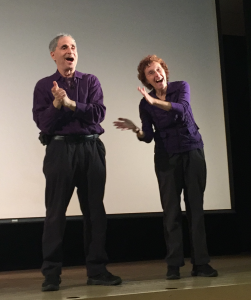 After watching Mr. Bean’s laundromat escapades, we had a laughter yoga session. We didn’t have to worry about traditional physical yoga postures—laughter yoga includes clapping, gestures, playfulness, and breathing. Everyone was a hearty laugher and we were all relaxed and smiling as we watched Mr. Bean’s horror as he tried to cope with raw oysters at a fancy restaurant.
After watching Mr. Bean’s laundromat escapades, we had a laughter yoga session. We didn’t have to worry about traditional physical yoga postures—laughter yoga includes clapping, gestures, playfulness, and breathing. Everyone was a hearty laugher and we were all relaxed and smiling as we watched Mr. Bean’s horror as he tried to cope with raw oysters at a fancy restaurant.
Our ending surprise was a delicious way to take Mr. Bean home— gourmet jelly beans!!
Click here for a short video experience.
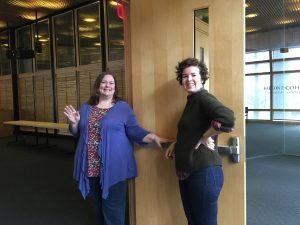 Stay tuned for our next Movies and Memories event in August!
Stay tuned for our next Movies and Memories event in August!
Want to have a movies and memories event right in your own home?
Here are a few tips:
If you’d like to make this an intergenerational experience, select a movie or clips you all might enjoy.
Choose a time of day when the person living with dementia will have good energy.
Get your favorite movie treats ready.
Create times to pause and chat about what you’ve seen.
Print out simple jokes as a great way to spread the laughter.
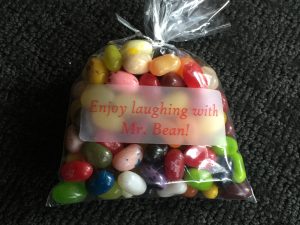 If you wish, offer a surprise at the end, either something that reminds you to laugh or smile. And if you like sweets, our jelly beans were a huge hit! With all those flavors, you have a lot to talk about!
If you wish, offer a surprise at the end, either something that reminds you to laugh or smile. And if you like sweets, our jelly beans were a huge hit! With all those flavors, you have a lot to talk about!


The Power of Play in the Dementia Journey
 Josh Rice, a theatre maker and teaching artist, discovered the power of play in the dementia journey when he was still in graduate school. As part of a school project, he partnered with a senior living community on a therapeutic puppetry and improv-based program for people living with dementia.
Josh Rice, a theatre maker and teaching artist, discovered the power of play in the dementia journey when he was still in graduate school. As part of a school project, he partnered with a senior living community on a therapeutic puppetry and improv-based program for people living with dementia.
Together, Josh and the seniors designed and made puppets, and created performances that included songs, personal stories, and comedy. As he worked with the new artists, he noticed people were using their puppets to tell stories. They expressed emotions and they enjoyed the chance to play and have fun. Staff applauded the participants’ short-term memory gains and tactile improvements.
“Plus, we were creating exciting work and performing for people,” Josh says.
Puppetry
One afternoon, a woman who was having a difficult day burst into the puppetry classroom. She was non-verbal but acted out aggressively in a way that could have potentially agitated others. As Josh and the students were rehearsing, she walked in and before she could disrupt the class, Josh made eye contact with her, and gently touched her shoulder. He quietly talked to her and invited her to join in or sit and watch. Within minutes she calmed down.
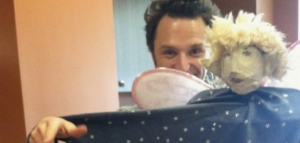 “I put a puppet in her hand and all of a sudden her language came back. It was like a switch had been turned on,” Josh says. This woman filled him with hope and inspired him. “I want people to understand that people who are living with dementia sometimes need us to be patient and keep giving them chances,” he says.
“I put a puppet in her hand and all of a sudden her language came back. It was like a switch had been turned on,” Josh says. This woman filled him with hope and inspired him. “I want people to understand that people who are living with dementia sometimes need us to be patient and keep giving them chances,” he says.
Being in the Moment
Josh knew the potential power of theatrical play and experimented with improv sessions for people living with dementia. The experiment worked.
“For improv, you have to listen and react,” Josh says. “The past or future doesn’t matter; it’s all about the present moment.”
He created a safe, nurturing, and creative atmosphere, offering structured improvisations, and invited his new improv team to play.
“They loved it and it was a thrill to watch them discovering new things and coming up with creative dialogues,” Josh says. “Play is an integral part of our lives and most of us need more of it.”


A Memorable Meeting: KC Memory Cafe
You know what it’s like, creating a program series for the first time. You try to think of everything, knowing that you’ve probably left something out. You hope plenty of people will attend and worry that no one will show up. The weather teases you, threatening snow or rain, thunder or wind. The “what if’s” line up, a mean group of scolders: “What if the elevator breaks? What if the speaker doesn’t show up? What if the snacks don’t arrive? What if the KC Memory Cafe doesn’t work!”
But, as most of us know, worry isn’t really that useful.
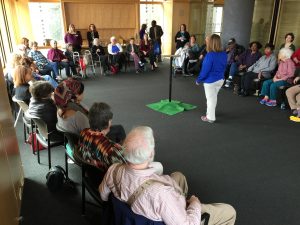 The debut of the KC Memory Cafe was beyond our highest expectations! On March 20, 2018, at 10:30 at the Plaza Library, the educators from the Kansas City Zoo showed up early, riding the elevator down to the lower level with their exotic offerings. The weather was perfect and a lovely group of 40 plus care partners and people living with dementia joined us, delighting in the delicious snacks. And they were even more delighted with the program, all of us laughing at the antics of the cockatoo, leaning forward to see the Vietnamese Tree Frog cozied in his glass aquarium, and petting the chinchilla, with a fluff of fur that felt like a cloud.
The debut of the KC Memory Cafe was beyond our highest expectations! On March 20, 2018, at 10:30 at the Plaza Library, the educators from the Kansas City Zoo showed up early, riding the elevator down to the lower level with their exotic offerings. The weather was perfect and a lovely group of 40 plus care partners and people living with dementia joined us, delighting in the delicious snacks. And they were even more delighted with the program, all of us laughing at the antics of the cockatoo, leaning forward to see the Vietnamese Tree Frog cozied in his glass aquarium, and petting the chinchilla, with a fluff of fur that felt like a cloud.
“I love this animal,” one attendee said, smiling at the blue tongued skink.
“This is the softest fur I’ve ever experienced,” said another, reveling in the chinchilla.
“That bird is so funny,” said another, laughing as the cockatoo bounced up and down, “dancing.”
After learning about the animals, we talked about our own pet memories. It was a wonderful morning and we can’t wait for our next Memory Cafe, on April 17, 2018.
Click here so you can experience the fun of the Cafe.
https://drive.google.com/open? id= 1mU8Iw83lGbhw6FeAVJ3VQ8xhe75qt YYm
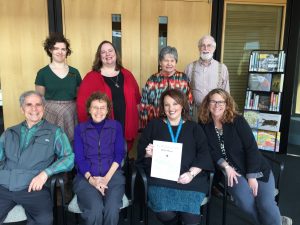 Want to join us on April 17 for our next Cafe? Here’s the scoop!
Want to join us on April 17 for our next Cafe? Here’s the scoop!
Weather Wonders: The Inside Story
Metereologist Karli Ritter Reveals Weather Mysteries 10:30 am on Tuesday, April 17, 2018. Plaza Library Lower Level. Join us for the KC Memory Cafe, a free event dedicated to creating educational and social experiences for people who are living with memory loss and for their care partners.
Our Team — Standing: Emily Cox, April Roy, Carol and Dennis McCurdy. Sitting: Ron Zoglin and Deborah Shouse, Jennifer Walker, Mandy Shoemaker
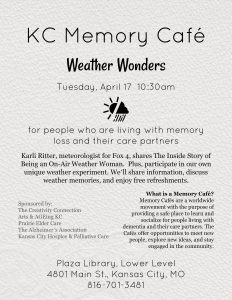


Educating on Dementia: A Vietnamese Doctor’s Quest
Throughout our journey in Vietnam, we met a number of inspiring elders. These include an 87-year-old public letter writer in the old Saigon train station, a 67-year-old woman carrying baskets of pomelos and bitter melons, a beautiful 74-year-old gardener hacking at weeds with a machete, a 100-year-old matriarch in a farming family, and an 83-year-old village chief. Because the life expectancy in Vietnam has risen over the last 20 years, its people are living longer. Along with that blessing comes an increased chance of dementia. Neurologist Trần Công Thắng. MD, and his team, Nguyen Tudny Vy and Le Thi Yen Vy, are dedicated to working with medical professionals and community members, educating on dementia.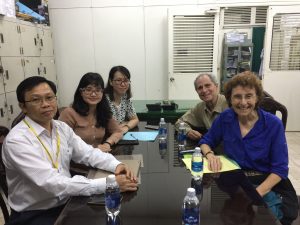
“Many people think memory loss is just part of normal aging, ” Dr. Thang told us, when we visited him in Choray Hospital in Saigon. “We want people to understand that dementia is not a regular part of growing older—it’s a brain disease.”
Twenty years ago, few people were discussing dementia in Vietnam. But now, it’s a vital issue for two reasons. First, the country’s life expectancy has increased from age 64 to age 75. Second, many families no longer have seven or more children; they have two to three offspring. This intensifies the burden for family caregivers.
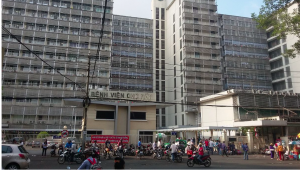 Dr. Thang is a researcher, speaker, educator, and a founding member of the Association of Vietnamese Alzheimer’s Disease and Neurocognitive Disorders. Through his classes and diagnostic clinics, Dr. Thang and his colleagues offer people much needed information and resources. He is partnering with a local rehabilitation hospital in creating a day program for those living with dementia. The program will offer cognitive stimulation and social engagement for those living with dementia.
Dr. Thang is a researcher, speaker, educator, and a founding member of the Association of Vietnamese Alzheimer’s Disease and Neurocognitive Disorders. Through his classes and diagnostic clinics, Dr. Thang and his colleagues offer people much needed information and resources. He is partnering with a local rehabilitation hospital in creating a day program for those living with dementia. The program will offer cognitive stimulation and social engagement for those living with dementia.
Person by person, Dr. Thang is helping healthcare professionals understand the behaviors and issues associated with dementia. He hopes to make life better for family caregivers and their family members who have memory loss.


Dementia in the Land of Vietnam
“We are here to see Dr. Nguyen Thanh Binh, head of the Department of Neuroloy and Alzheimer Diseaese,” I tell the guard at the National Geriatric Hospital of Vietnam in Hanoi, showing him my folded paper with her name printed on it.
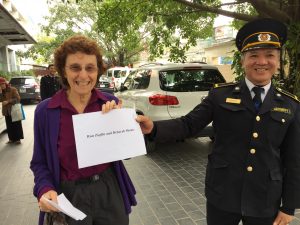 He grins, then points to a full size sheet of paper in the security booth’s window with our names printed on it. We follow him into the hospital and up a flight of stairs. After a short wait, Dr. Binh warmly welcomes us into her office. She has a table ready with chairs and tells us she has invited others from her department to talk to us as well. Another Dr. Nguyen Thanh Binh arrives. Her Phd thesis was on easing the burden for family caregivers. Dr. Ngan Thi Hong Anh, doctor of rehabilitation, joins us. She seeks non-medical solutions for improving quality of life. Nguyen Ngoc Anh, RN, completes our group. She works daily, communicating with and caring for people who are living with dementia.
He grins, then points to a full size sheet of paper in the security booth’s window with our names printed on it. We follow him into the hospital and up a flight of stairs. After a short wait, Dr. Binh warmly welcomes us into her office. She has a table ready with chairs and tells us she has invited others from her department to talk to us as well. Another Dr. Nguyen Thanh Binh arrives. Her Phd thesis was on easing the burden for family caregivers. Dr. Ngan Thi Hong Anh, doctor of rehabilitation, joins us. She seeks non-medical solutions for improving quality of life. Nguyen Ngoc Anh, RN, completes our group. She works daily, communicating with and caring for people who are living with dementia.
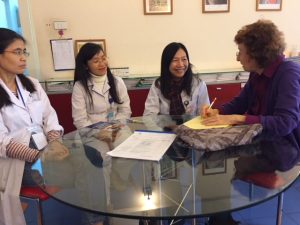 For two years. Dr. Binh and her team have been running a pilot study, inviting people who are living with dementia to attend a three day a week program that focuses on engaging socially, physically, emotionally, and intellectually. They use music therapy techniques, they bake traditional cakes together, and they enjoy various arts and crafts projects. All these therapies offer physical and occupational therapies, as well as vital social interactions. The project has been a huge success, with both family caregivers and people living with dementia enjoying the results. Besides giving the caregivers a much needed respite, families report improved quality of life and and increased abilities in the activities of daily living.
For two years. Dr. Binh and her team have been running a pilot study, inviting people who are living with dementia to attend a three day a week program that focuses on engaging socially, physically, emotionally, and intellectually. They use music therapy techniques, they bake traditional cakes together, and they enjoy various arts and crafts projects. All these therapies offer physical and occupational therapies, as well as vital social interactions. The project has been a huge success, with both family caregivers and people living with dementia enjoying the results. Besides giving the caregivers a much needed respite, families report improved quality of life and and increased abilities in the activities of daily living.
“Symptoms improve,” Dr. Binh reports. “Patients want to keep attending and families have their burdens eased.”
Dr. Binh and her team have extended the program.
 Often people come to the hospital, seeking answers to issues related to memory loss. Many elders live at home with extended families, and their children and grandchildren are frequently confounded by their cognitive impairments and other symptoms of dementia. Dr. Binh and her associates offer education, information, and comfort. They describe the disease and try to help families move beyond their initial feelings of hopelessness. They encourage families to accept and embrace their elder and support him or her in living a meaningful life.
Often people come to the hospital, seeking answers to issues related to memory loss. Many elders live at home with extended families, and their children and grandchildren are frequently confounded by their cognitive impairments and other symptoms of dementia. Dr. Binh and her associates offer education, information, and comfort. They describe the disease and try to help families move beyond their initial feelings of hopelessness. They encourage families to accept and embrace their elder and support him or her in living a meaningful life.
We left our meeting with these remarkable women feeling inspired. They are doing important work and making a difference for the people of Hanoi and Vietnam.


Movies and Memories—An Oscar-Winning Experience
“Thank goodness for this program,” one of our Movie and Memories’ guests told us. “There are so few places Mom and I can enjoy going together these days.”
“Thanks for this cookie. I could really use a little nurturing today,” another said.
“My goodness, I was delighted to learn about this program,” another said.
“What a treat, to have these films and these treats for free,” a couple told us.
Everyone arrived ready for movie magic. One of our volunteers from the Alzheimer’s Association brought a generous tray of cookies and brownies to share with everyone.
“How will we ever eat all those cookies?” I wondered initially. Well, it turns out, we had a large and wonderful group of sweet sweet-lovers, who thoroughly enjoyed the films and the feast.
Our three Oscar-nominated shorts met with great approval and included Glas, Joe’s Violin, and Room on a Broom. When Michelle Niedens, Director of Education and Programs at the Heart of America Alzheimer’s Association, asked us all, “Which short would you have voted for?” it was between the inspiring documentary of a Holocaust survivor giving his beloved violin to a blossoming music student and the beautifully inclusive and tender animated Room on a Broom.
Save Sunday April 8 at 2:00 for our next Movies and Memories event and join us for this meaningful dementia and family friendly film series. To make sure you know about the series, sign up for the library’s newsletter at http://www.kclibrary.org/newsletter/special-events-signup We’ll be part of the Kansas City Film Festival—visit Kansas City FilmFest to learn more about their line up. Want to help us spread the word or have an idea for a great movie to show? Just email Deborah at myinfo@pobox.com


A Winning Combination: Children, Exercise, and Music
An orderly group of five-year-olds walk into the dining room at Vernon Manor in Viroqua, Wisconsin. The residents are waiting for them. Each child goes up to an elder and introduces him or her self. Then Ingrid Constalie, AD-BC, CDP, Board Certified Activity Director and Certified Dementia Practitioner, talks to the assemblage about the importance of staying fit. The residents nod sagely: many of them are in their eighties and nineties and they exercise every day. But the days that the kindergartners join them are the best, a winning combination or children, exercise, and music.
The residents love teaching the kids the alphabetic movements to the iconic YMCA song. And the kids are a burst of giggles and wiggles as they fold their arms into wings, strut around, and teach everyone The Chicken Dance.
Ingrid’s focus is creating moments of joy, engagement, and connection.
Her intergenerational activities spark the residents and reduce the stigmas of aging and dementia by educating and informing local children, teens, their teachers, and other members of the community.
“This dancing and exercise exchange is simple, energizing, and very successful,” Ingrid says.
Sing-O at Bingo
Music Bingo offers middle schoolers a chance to work with Ingrid’s elders.
“This is about creating a good experience for your partners,” Ingrid coaches the children in advance. “You are their connection to the world.”
Ingrid plays an opening melody, using songs such as “Happy Trails,” “You Are My Sunshine,” and “Singing In the Rain.” Those who know the title shout it out. Often, partners confer with each other. The children help locate the song title on the bingo card and place a poker chip on each answer. Even people living with advanced dementia enjoy listening to music and being around the children.
Most of the time, the school children are chatty and at ease. But one girl was scared coming into the care community.
“I paired her with Helen, a woman deep into dementia,” Ingrid says. “Within minute, Helen had her arm around the girl and they were both laughing.”
Even children who act up at school are wonderfully behaved during the Bingo experience.
Creating Comparisons and Compassion
Recently, Ingrid orchestrated a project with a high school English class. They interviewed residents and did a comparison and a contrast. For example: “While Clara is getting out of bed with the assistance of staff, I am getting ready for school. While she wheels herself down a long hallway to a dining room, I am eating toast with my sister.”
The teenage journalists asked simple questions, like “What is your morning like?” “How do you spend your afternoon?” “How do you like to dress?”
The students wrote up the results and made booklets. One family was so inspired by the insights in the booklet, they later read parts of it at the woman’s funeral.
Ingrid’s intergenerational connections explore understanding, create empathy, and help create exciting new relationships.


Six Secrets of Dementia Inclusive Holiday Cooking
I named my brother Dan, our head chef, first. Then I included the support team—myself, my mom, my daughters and nephews.
“Did I help?” Mom whispered as I passed her the mashed potatoes.
“You sure did,” I told her. ”You mashed the potatoes, put the marshmallows on the sweet potato casserole, and mixed the fruit salad.”
“That’s good,” she said. “I like to help.”
Our desire to help and contribute to seasonal celebrations doesn’t end with a diagnosis of dementia. It’s lovely to linger in the kitchen together, preparing food for the holidays. It’s even lovelier when you can adapt and enjoy dementia inclusive holiday cooking so that people of varying abilities can participate.
Rebecca Katz, author of The Healthy Mind Cookbook, sees food as a great equalizer, something anyone can enjoy regardless of abilities. Fixing a delicacy for someone offers a tangible and delicious way to give back.
Here are six secrets of iementia Inclusive holiday cooking.
- Leaf through a favorite family cookbook or recipe box and use the pictures and recipes as a catalyst for conversation. Ask open-ended questions, such as, ”What does that brownie recipe make you think of?” “What do you like about the holiday season?”
- Chose a time of day when you’re both rested.
- Create a comfortable kitchen environment, by playing familiar seasonal songs you can both hum or sing along to. Reduce extraneous noise and distractions, such as a television in the background.
- If you wish, take photos during the experience. That way, you can relive the adventure and share with family and friends.
- Indulge in instant gratification, if possible, by sampling your work when the cooking is complete.
- Even if the person living with dementia can’t help prepare food, he can still enjoy sitting in on the action and the conversation.
Whether you’re stirring a pot of orzo or dropping mint leaves into cool water, enjoy your time of creation and connection in the kitchen.
A longer version of this piece originally appeared on Joan Lunden’s excellent website: Enjoy Dementia Inclusive Holiday Cooking. Thanks to Sue Fitzsimmons, MS, ARNP, Judith Fertig, author of The Memory of Lemon, Kate Pierce, LMSW, Alzheimer’s Association Greater Michigan Chapter, and Rebecca Katz, author of The Healthy Mind Cookbook
Deborah Shouse is the author of Connecting in the Land of Dementia: Creative Activities to Explore Together and Love in the Land of Dementia: Finding Hope in the Caregiver’s Journey.
7 Tips for Reducing Caregiver Isolation
Some years ago, when my mom was diagnosed with dementia, I didn’t know anyone else who was going through this journey. I felt very alone, even though I had a beautiful network of friends. I turned to writing to help me make sense of the situation. Eventually, I gathered the courage to share my personal essays with others, often through simply reading my stories aloud to friends and family. Being able to share my thoughts and feelings on this deeply meaningful dementia experience was so therapeutic, and it inspired me to reach out to other caregivers. Through my years as a family caregiver and through interviewing dozens of caregivers and experts in the field of dementia, I gleaned these 7 tips for reducing caregiver isolation.
Listening
When my friend Karen asked me to tell her more about my mom’s life, I was thrilled. I had been so immersed in my caregiving responsibilities, I had forgotten Mom’s fascinating adventures as a nurse in WWII, her worldwide travels, and more. Simply asking questions about the person who is living with dementia and listening avidly to the stories is a gift to the caregiver.
Visiting
“Your mother is so interesting,” my friend Jane said. Jane had offered to simply come to my house and have a short visit with me and Mom. My mother was going through a period of repetition and I had heard her tale of the natural hot springs in Iceland at least 113 times. But watching Jane lean forward, ask cogent questions, and smile at Mom allowed me to appreciate Mom’s stories in a new way. These were cornerstones in my mother’s life and Jane’s interest reminded me what treasures they were.
Enriching
Mom had been a vibrant movie-goer, an avid opera lover, and an ardent museum enthusiast. But when she could no longer go out, I loved it when people offered to bring arts, culture, and the occasional dog, to us. Studies show that even indirect contact with animals reduces stress. Visits from small dogs and cuddly babies boosted both our spirits and helped us feel connected with our community.
Bringing over an art book and gazing at favorite painters together invited out the creative spirit and were a catalyst for open-ended conversation. Singing and playing music with others stirred up positive memories and filled us with happiness and well-being.
Exercising
So often, caregivers forget the power of fresh air and exercise. They forget the joy of sunshine and trees. When they don’t have the steam to set out on their own, offering to take them on a stroll, a run, to a yoga class, or just to sit on a bench in a park, can offer moments of connection and renewal.
Noticing
“What can I do for you?” my life-partner often asked. Frequently, I was so overwhelmed I had no answer. So he asked me concrete questions. “Do you need any errands run?” “Would you like me to make dinner?” “Are there phone calls I can help you make? Grocery shopping I can do?” Offering to do simple tasks helped me understand I did not have to soldier through this alone. Help was all around me and one of my spiritual journeys was learning how to receive it.
Inviting
It’s not always easy to stay connected with friends who are living with dementia and their caregivers, but it is so worth it. Even when my mother felt lost at social gatherings, she still enjoyed the energy of being around empathetic friends. Even when she didn’t understand every speck of conversation, she relished being around others and meeting new people. So did my father and so did I. Having friends reach out with invitations reminded us we were still part of our community.
Asking
Sometimes we don’t know what to say to our friends who are caregivers for those living with dementia. We don’t know what to do. Then it’s time to simply state the truth and tell them, “I want to be there for you, to understand what you’re going through. I want to support you, and I don’t quite know how to do it. Can you guide me?”
Chances are the answer will be a warm hug and a resounding, “Yes.”


